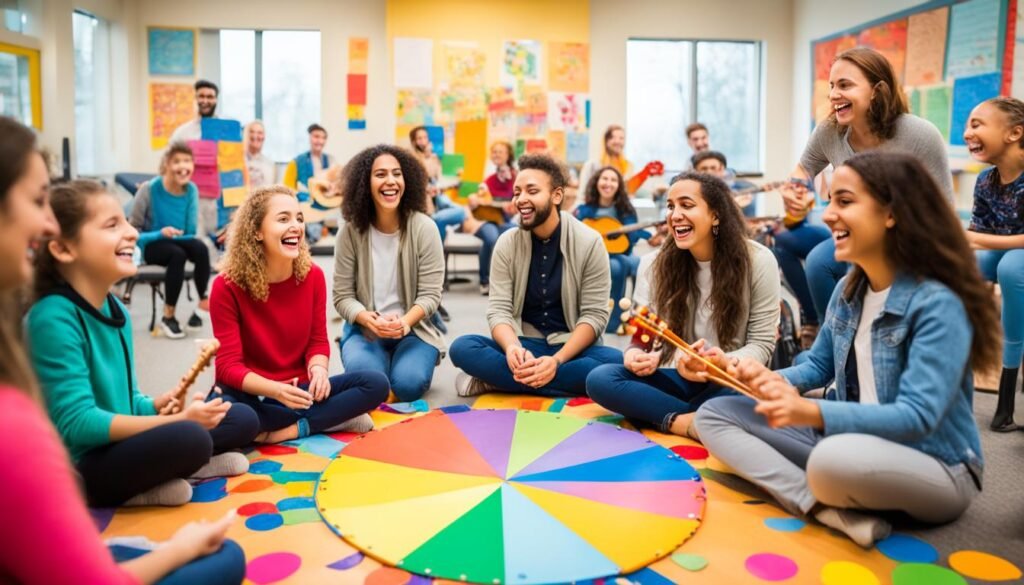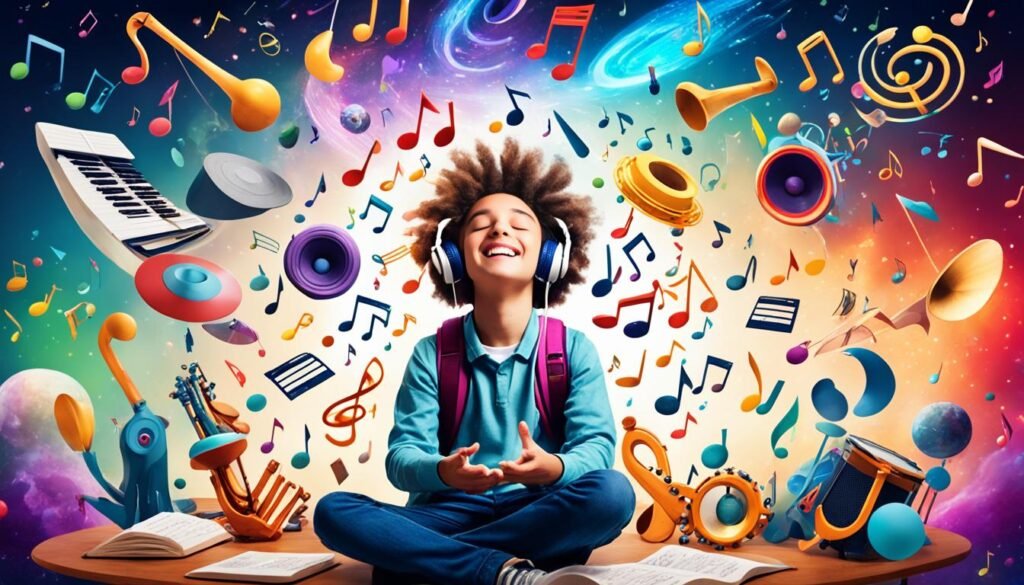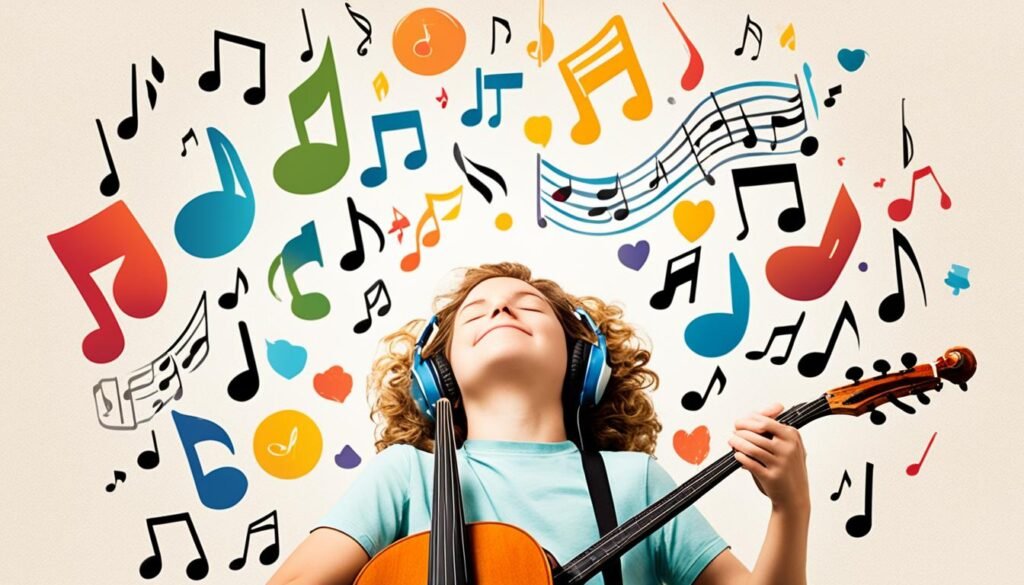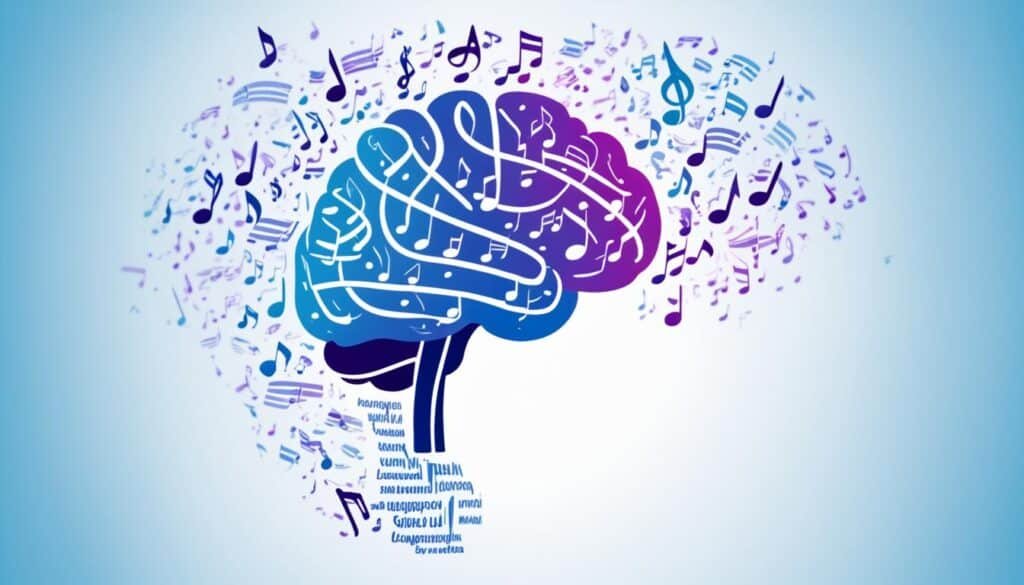Importance Of Music : Music holds immense significance in the lives of students, offering a myriad of benefits that impact their academic performance and emotional development. It is a universal language that transcends barriers and has the power to unlock the potential within each student. Incorporating music education programs in schools provides a holistic approach to learning, stimulating cognitive abilities, fostering creativity, and nurturing social skills.
Research has shown that music education offers numerous advantages to students. It enhances memorization skills, keeping them engaged in the learning process. It acts as a catalyst for emotional growth, enabling students to express and understand their feelings effectively. Moreover, music serves as a form of stress relief, promoting mental well-being.
By recognizing the crucial role of music in a student’s life, schools can create a nurturing environment that fosters a love for music, while simultaneously supporting their overall development.
Key Takeaways:
- Music education in schools benefits students academically and emotionally.
- It enhances memorization skills and keeps students engaged in learning.
- Music acts as a medium for emotional expression and stress relief.
- It nurtures creativity, imagination, and social skills.
- Music education creates a lifelong appreciation for music and valuable life skills.
Enhanced Memorization Skills
Music education plays a significant role in enhancing students’ memorization skills. By engaging their memory to remember notes and lyrics, students develop a heightened ability to retain and recall information. Sheet music, in particular, provides a comprehensive approach to memory engagement.
Songs and melodies are commonly used by both parents and teachers to help students learn, memorize, and remember various things. Whether it’s nursery rhymes to teach the alphabet or educational songs to remember historical events, music serves as a powerful tool for reinforcing and retaining knowledge. The rhythmic and melodic elements of music aid in the encoding and retrieval of information, making it easier for students to recall facts and concepts.
Also Read: 10 Must-Hit Milestones In Your Music Career Journey
“Music is the language of memory.”
Through music education, students develop enhanced memorization skills that extend beyond the realm of music itself. They learn how to organize and structure information in their minds, making it easier to memorize and remember important details in other subjects, such as math, science, and literature.
Music’s powerful impact on memory is not limited to the classroom. Even outside of academic settings, individuals often use music as a mnemonic device to memorize things like phone numbers, addresses, and even foreign languages.
Overall, music education provides students with the tools and techniques to enhance their memorization skills, allowing them to effectively learn, memorize, and remember information that will benefit them academically and throughout their lives.
Also Read: Exploring The Boundaries Of Music Copyright
Music in School helps Keep Students Engaged
Music education in school plays a vital role in creating an enjoyable learning experience for students and acts as a breath of fresh air amid academic pursuits. With its status as a universal language, music has the power to trigger a range of emotional responses, from subtle feelings to explosive energy. Whether as a separate subject or integrated into regular classes, music has the ability to support any area of study, making it an indispensable tool for engaging students in their learning journeys.
Integrating music into the curriculum allows students to experience a more holistic and well-rounded education. By incorporating melodies, rhythms, and harmonies into lessons, teachers create a dynamic environment that fosters curiosity and creativity. This not only enhances students’ understanding and appreciation of music itself but also provides a unique platform for exploring other subject areas.
When students are exposed to music in school, they have the opportunity to develop a deeper connection with their learning materials. As they engage with musical concepts, they are simultaneously exposed to mathematical patterns, historical contexts, literary themes, and scientific principles. The integration of music into various subjects enables students to explore these disciplines through a new lens, enhancing comprehension and facilitating a more enjoyable and memorable learning experience.
In addition to supporting academic subjects, music in school also cultivates important life skills. Students learn about teamwork, discipline, and perseverance as they collaborate with others in ensembles, bands, or choirs. They develop their communication and social skills through musical interactions, expanding their understanding of different cultures and perspectives.
Also Read: Exploring The Premier Music Colleges For Career Advancement
The impact of music in school goes beyond the classroom. It helps students develop a lifelong love for music, fostering creativity, emotional expression, and personal growth. By actively engaging with music, students not only benefit from improved academic focus but also find an outlet for relaxation, self-expression, and stress relief. Music truly has the power to uplift and inspire, creating a rich and meaningful educational experience for students of all ages.
Music in School: A Transformative Influence
When music is integrated into the school curriculum, it revolutionizes the way students engage with learning. It captivates their attention and ignites their imagination, enabling them to explore new horizons and reach their full potential. By embracing music education in schools, we empower students to thrive academically, socially, and creatively, fostering a meaningful and enjoyable educational journey for all.
Improved Social Skills

Music education goes beyond the development of musical skills and knowledge; it also plays a crucial role in fostering improved social skills among students. Through participating in choirs, orchestras, and competitions, students have the opportunity to collaborate and work as a team, honing their teamwork abilities and fostering a sense of camaraderie.
Also Read: Insider Tips On Music University Scholarships For International Students
These musical endeavors require students to interact with their fellow musicians, teaching them valuable lessons in communication and cooperation. They learn to listen, communicate their ideas, and respectfully engage with others to create a harmonious performance.
The interactions that occur during music education allow students to develop new relationships and forge connections with people from different backgrounds and cultures. Whether it’s through sharing a love of music or discovering unfamiliar musical traditions, students gain a broader understanding of different cultures, promoting empathy and an appreciation for diversity.
By collaborating and interacting with others in a musical context, students develop essential social skills that can benefit them outside the realm of music. These skills, including communication, teamwork, and cultural understanding, have a positive impact on their overall social interactions.
Also Read: How Music University Enhances Academic And Creative Growth
| Social Skills Developed in Music Education | Benefits |
|---|---|
| Teamwork and Collaboration | Students learn to work together towards a common goal, fostering a sense of unity and cooperation. |
| Communication | Engaging in musical activities requires effective communication, enhancing students’ ability to express themselves and listen to others. |
| Cultural Understanding | By exploring music from different cultures, students gain a deeper understanding and appreciation for diversity. |
Develops Imagination

Music education plays a transformative role in developing the imagination of students. As they engage with music, whether by listening or creating their own compositions, students have the opportunity to explore their imaginations and bring their ideas to life.
When listening to music, students often find themselves creating vivid images and scenarios in their minds. The melodies, harmonies, and rhythms stimulate their creativity, leading them to visualize stories, landscapes, and characters that reflect the emotions and moods evoked by the music.
Moreover, music education encourages students to think outside the box and come up with new lyrics, notes, compositions, and tunes. By engaging in the creative process, students can tap into their imagination to craft unique and innovative musical expressions.
This imaginative thinking fostered through music education is not only enjoyable but also essential for their future personal and professional success. It enhances their ability to think abstractly, solve problems creatively, and approach challenges in innovative ways.
Music education empowers students to think freely and explore the endless possibilities within music. It gives them the confidence to express themselves authentically and develop their artistic voice. Through this exploration, students can develop and refine their imaginative skills, setting the stage for a lifetime of creative thinking.
| Benefits of Music Education in Developing Imagination |
|---|
| Stimulates the imagination through listening to music |
| Encourages students to think creatively and come up with new compositions |
| Enhances abstract thinking and problem-solving skills |
| Promotes personal and professional success |
Develops Creative Thinking

Music education goes beyond teaching students how to play an instrument or sing. It also serves as a powerful tool for developing creative thinking skills.
Music stimulates the brain and encourages students to think outside the box, coming up with innovative ideas and solutions to problems. Whether it’s composing a new song, improvising on an instrument, or exploring different musical genres, music education provides opportunities for students to unleash their creativity.
When students engage in music activities, they are challenged to think critically, analyze musical patterns, and experiment with different musical elements. This process stimulates their brain and nurtures their ability to think creatively.
One of the key aspects of creative thinking developed through music education is the ability to approach problem-solving in a unique way. Music requires students to think divergently and find unconventional solutions. This skill translates into other areas of life where out-of-the-box ideas are often needed to tackle complex situations.
Music Education and Problem-Solving
Music education equips students with problem-solving skills that extend beyond the realm of music itself. Through music, students learn to navigate challenges, make decisions, and find creative solutions.
As students collaborate with others in ensembles or bands, they develop teamwork and communication skills, essential for problem-solving in a group setting. They learn to listen to and appreciate others’ ideas, combining them with their own to find harmonious solutions.
Musical creativity is about exploring new possibilities, taking risks, and finding solutions that resonate with the emotions and messages we want to convey.
Benefits of Music Education for Creative Thinking
| Benefits | Description |
|---|---|
| Stimulates Brain | Music engages various cognitive processes, stimulating the brain and promoting creative thinking. |
| Out-of-the-Box Ideas | Music encourages students to think beyond traditional boundaries and explore unconventional ideas. |
| Problem-Solving | Music education teaches students to approach problems from multiple perspectives and find creative solutions. |
The combination of stimulating the brain, encouraging out-of-the-box ideas, and promoting problem-solving skills makes music education a powerful catalyst for developing creative thinking abilities. By fostering creative thinking, music education provides students with a unique advantage in navigating the challenges of an ever-changing world.
Helps in Relaxing and Healing

Music has the incredible power to heal and relax the mind and soul. It has long been recognized as a form of therapy for mental health conditions, including academic stress and pressure. Music education provides students with a valuable outlet to unwind, express themselves, and find solace in the harmonies and melodies.
Through music, students can find a sense of calmness and relief from the pressures of academic life. Engaging in music therapy allows them to connect with their emotions, releasing the tension and anxiety that may have built up throughout the day.
Listening to soothing melodies or participating in singing and dancing can truly transform the atmosphere and create a peaceful environment. The healing power of music extends beyond the surface level, permeating deep into the mind and soul, promoting overall well-being.
Studies have shown that music therapy can relieve academic stress and help students manage their emotions effectively. It acts as a therapeutic tool, offering a safe space for students to explore their feelings and find comfort amid the challenges they face.
Moreover, music has a profound impact on the mind and soul. It has the ability to evoke emotions, uplift spirits, and create a sense of harmony within oneself. By immersing oneself in the world of music, students can find solace and healing, allowing the mind and soul to rejuvenate.
Whether it’s through listening to calming melodies or actively participating in music-making activities, students can experience the soothing and healing effects that music brings. Music therapy not only helps in relieving academic stress but also supports mental and emotional well-being, nurturing the mind and soul.
| Benefits of Music Therapy | Effect |
|---|---|
| Reduces stress and anxiety | Creates a sense of calmness and relaxation |
| Promotes emotional well-being | Supports expression and release of emotions |
| Aids in improving focus and concentration | Enhances cognitive abilities and mental clarity |
| Enhances self-awareness | Encourages reflection and introspection |
| Fosters a sense of belonging and connection | Encourages social interaction and community engagement |
Builds Self-Confidence

Music education plays a crucial role in building self-confidence in students. Through music, students are provided with opportunities to perform in front of a group, whether it’s in a school concert, choir performance, or band recital. These performances allow students to showcase their skills and talents, and the positive feedback and appreciation they receive from friends, family, and teachers have a profound impact on their self-esteem.
Performing in front of a group instills a sense of accomplishment and pride in students. It boosts their confidence as they receive recognition for their hard work and dedication. The applause and encouragement they receive after each performance serve as strong motivators, pushing them to pursue their musical passions even further.
This newfound confidence acquired through music education extends beyond the realm of music. It seeps into other aspects of students’ lives, giving them the courage and self-assurance to take on new challenges and excel in various endeavors. Whether it’s presenting a project in class, participating in sports, or pursuing academic goals, the confidence instilled through music education acts as a solid foundation for success.
“Music education has not only helped me find my voice on stage but also in life. The support and encouragement I received after performing in front of a group transformed my self-confidence. It has given me the belief that I can accomplish anything I set my mind to.” – Sarah, high school student.
Music education fosters an environment that embraces and celebrates individuality, nurturing students’ self-expression and allowing them to explore their unique abilities. It encourages them to step out of their comfort zones and take risks, which further strengthens their confidence and resilience.
Ultimately, the self-confidence built through music education empowers students to overcome challenges, pursue their dreams, and reach their fullest potential.
| Ways Music Education Builds Self-Confidence |
|---|
| Provides opportunities to perform in front of a group |
| Receives appreciation and motivation from peers, family, and teachers |
| Instills a sense of accomplishment and pride |
| Boosts confidence in pursuing other endeavors |
| Empowers students to embrace their uniqueness and take risks |
Music Improves Language Skills

Music education is not only beneficial for developing musical abilities in students but also plays a significant role in improving language skills. By engaging in music, students can enhance their language processing abilities within the brain, leading to improved language development and communication skills.
Learning a musical instrument, such as the piano or violin, can have a positive impact on the brain’s ability to process human language. Research has shown that individuals who learn a musical instrument have a more developed auditory neural pathway, which directly contributes to language processing.
When learning to play a musical instrument, students must listen to and interpret musical notes and rhythms, which engages the brain’s auditory and language centers. This active engagement strengthens the neural connections involved in language processing, resulting in improved language skills.
Furthermore, music involves the use of patterns, sequences, and structures, which are also fundamental aspects of language. As students learn to read and interpret sheet music, they are unknowingly enhancing their ability to recognize and understand linguistic patterns, aiding in the development of language skills.
Fostering Bilingualism Through Music
Learning a musical instrument can also be particularly beneficial for students who are learning a second language. The cognitive benefits gained through music education, such as enhanced auditory processing and pattern recognition, can significantly support language learning.
Research has shown that individuals with musical training have an advantage in acquiring a second language. The inherent overlap between music and language processing in the brain allows students to transfer their enhanced language skills from music to the spoken or written word.
By engaging in music education, students develop a heightened sensitivity to pitch, rhythm, and cadence, which are essential elements of language. This heightened awareness enables them to better perceive and reproduce the nuances of a new language, facilitating their bilingual development.
Incorporating music into language learning classrooms has also shown promising results. The rhythmic patterns and melodic aspects of music can aid in vocabulary retention, pronunciation, and overall language comprehension. By combining music and language, educators can create a dynamic and engaging learning experience that promotes language development.
Music Enhances Language Skills: A Visual Representation
To further illustrate the connection between music and language skills, the following table provides a visual representation of the key ways in which music education improves language processing:
| Benefits | Explanation |
|---|---|
| Enhanced Auditory Processing | Music education strengthens the brain’s ability to process auditory information, benefiting language processing as well. |
| Pattern Recognition | Learning to read and interpret sheet music enhances the brain’s ability to recognize and understand linguistic patterns. |
| Cognitive Transfer | The cognitive skills developed through music education can be transferred to language learning, aiding in bilingualism. |
| Improved Sensitivity | Engaging in music education heightens students’ sensitivity to pitch, rhythm, and cadence, facilitating language perception and reproduction. |
| Vocabulary Retention | The rhythmic patterns and melodic aspects of music can assist in vocabulary retention and language comprehension. |
In conclusion, music education not only cultivates musical talents but also contributes to the development of language skills. By improving language processing within the brain, learning a musical instrument and engaging in music education provide students with valuable tools for language development, improved communication, and even bilingualism.
Conclusion
Music plays a crucial role in a student’s life, enhancing cognitive, emotional, and social growth. Music education programs in schools provide numerous benefits, including enhanced memorization skills, improved academic engagement, development of social and communication skills, stimulation of imagination and creative thinking, stress relief, building self-confidence, and improving language skills.
The importance of music education goes beyond the classroom, as it helps students develop a lifelong love for music and valuable life skills. Participating in music education programs allows students to explore their passions, develop their creativity, and build strong social connections through teamwork and performances. It nurtures their ability to express themselves and develop a sense of identity and self-confidence.
Furthermore, music education programs support the holistic development of students, fostering their intellectual, emotional, and social well-being. By engaging with music, students become more adaptable, resilient, and open-minded individuals. Music encourages them to think critically, solve problems creatively, and appreciate cultural diversity.
Also Refer : 10 Must-Hit Milestones In Your Music Career Journey
FAQs
Q: Why is music important in a student’s life?
A: Music is a crucial aspect of a student’s learning journey. Studies show that music has been shown to help improve students’ academic performance and develop social skills through exposure to music.
Q: How can music benefit students academically?
A: Learning music can help students perform better in their studies. Teachers use music training to enhance students’ cognitive skills and believe that music also stimulates different areas of the brain.
Q: What social benefits can students derive from music?
A: Music has a way of bringing people together. Students who engage in music classes or learn to play an instrument often develop social skills and coordination through continued music practice.
Q: Why do educators emphasize arts education, including music?
A: Educators understand that music can help students be ready to learn. They recognize that music lessons not only foster creativity but also improve students’ overall well-being.
Q: How does music contribute to a student’s personal development?
A: By learning to read music and play musical instruments, students also build perseverance, discipline, and patience. Music training can positively impact students’ growth and character.
Q: Are there any studies supporting the benefits of music in a student’s life?
A: Studies have consistently shown that music education enhances cognitive abilities and social interactions in students. Exposure to music early on can have a lasting positive effect on a student’s development.
Q: Can music help students in non-academic areas as well?
A: Yes, music is also known to help in developing coordination skills through continued practice. Learning music can have a holistic impact on a student’s overall skillset and capabilities.
Source Links
- https://stagemusiccenter.com/music-school-blog-winchester-acton-ma/2022/8/7/the-importance-of-music-in-school-why-music-education-matters
- https://leverageedu.com/blog/importance-of-music-in-life/
- https://mramusicplace.net/2022/08/25/what-music-means-to-students-and-why-thats-important/




